- Home
- Jason Webster
Andalus Page 4
Andalus Read online
Page 4
He started laughing.
‘What’s so funny?’
‘Jasie, if this is a Moorish country, why don’t they give me a job?’ He slapped the glove box in front of him. ‘Look at me! I’m a Moor. You think this is a Moorish country? Why do they want to throw me out all the time, then? Yes, this is true. Spain, Al-Andalus, was once an Islamic country, a great Islamic country. But this is all history now.’
I couldn’t deny he might be right and I was anxious not to allow too much romanticism to creep in. Nonetheless I had to keep my eyes open for what others had failed to see.
‘The great age of tolerance and co-existence between Moors and Christians is over,’ he said. ‘In the past Muslims conquered the West. Now the West conquers the Muslims. Perhaps the Muslims will one day conquer Spain again. Then you can say Moorish Spain. But not now.’
Distracted by our conversation, I had failed to notice that the needle showing the engine temperature had swung over dramatically to the right. Steam began to appear from under the bonnet.
‘We’re overheating!’
It was an old car, and the school teacher who’d sold it to me had mumbled something about having to top up the water levels every week or so. But he’d seemed the over-cautious type, and I’d ignored his warning. I swerved the car towards the hard shoulder as quickly as I could, missing a camper van in the slow lane by only a few feet.
‘It’s all right, Jasie.’
A red warning light started glaring at me from the dashboard. We rolled into the narrow, gritty emergency lane and ground to a halt.
The bonnet burnt my hands as I lifted it up and the steam wrapped itself around my face.
‘Radiator,’ said Zine as he leant over beside me. He bent down almost double to have a look, supporting himself on my shoulder, then stood up and sniffed, turning away to go back inside. I was rather hoping he might know a thing or two about engines but it looked as if the two of us were as ignorant as each other. And we were stranded. Gazing up in the fuzzy light, no emergency phone was visible, and I resigned myself to trudging up the side of the motorway in the heat until I could find someone to help. A Gypsy had once stopped to help me in similar circumstances, silently and swiftly changing my tyre with his jack as though following an ancient travellers’ code. But such instances were rare: you couldn’t rely on it happening a second time. I looked down again at the engine. With any luck it wouldn’t be too damaged, but I would be lucky to get back home that night. Might have to stay in a hotel. And what was I going to do with Zine?
At that moment he appeared once again by my side.
‘I found some gum in the side pocket of the door,’ he said, chewing away with his cheerful grin. The car’s broken down, it’s a searingly hot afternoon, lorries are growling past us only inches away and we’re in the middle of nowhere. If we don’t get knocked dead by an eighteen-wheel juggernaut we’ll die of heat exhaustion. And he’s looking for chewing gum?
He read the expression on my face and put his finger to his mouth to stop me from saying anything. Taking the white misshapen lump from between his teeth he bent double again over the engine and reached down with his hand.
‘There,’ he said, standing up. ‘Got any water in the back?’
‘What have you done?’
‘I’ve plugged the hole in the radiator. It’s stopped leaking. We just need to fill it up with more water and we’re fine for another hundred kilometres.’
‘Are you sure?’ I thought he was pulling my leg.
‘Jasie, trust me,’ he laughed.
VALENCIA
‘¡Hala!’
Two days after arriving safely in Valencia, we walked into the Plaza de la Virgen as a group of worshippers spilled out from the church after a late-night mass in honour of Valencia’s patron the – Virgin of the Defenceless. Elderly women pushed past the Romanian beggars at the entrance, calling over to one another with expressions of joy and surprise as they past through the opening and closing leather-padded doors. I lost track of all the different religious feast days and celebrations through the course of the year, but tonight looked like a special occasion for devotees of the starspangled statue of the mother of Jesus inside. La Cheperudeta, they called her – the hunchback – for her oddly stooped posture.
‘¡Hala!’ The cries of the women could be heard all around the square.
We’d come out for dinner in the centre of town. It was a Friday, and the streets and squares of the Carmen, the old Arab quarter, were filled with people of all ages going out for a drink and meeting up with friends. Valencia had just been declared the noisiest city in Europe: much of the racket, I felt sure, came from the all-night restaurants and bars that lined many of the narrow lanes of the casco histórico. Valencianos prided themselves on being fiesta people, and not to have made the decibel top spot would probably have been a cause for shame. It was midnight already and we’d yet to sit down and eat anywhere – it was going to be a long night.
Zine had spent much of the previous day sleeping on the sofa bed in our sitting room, the cats sniffing curiously around the clothes he’d dropped on the floor and curling up around his legs. As ever moved to help someone in need, Salud had pulled out some old trousers and shirts of mine for him to wear: they fell loosely on him, but when they were tucked in and secured with a belt he just looked as if he’d been dieting a bit too hard. She was as concerned as I was that we should find him work as soon as possible, but the only real chance we had was with her father, an elderly orange farmer who lived south of the city. It was worth trying him out, but she was doubtful.
‘He’s getting old. I don’t know if he takes people on any more.’
Nonetheless, we’d decided to head out with Zine to her parents’ village the following day.
My voyage of discovery around Moorish Spain had just begun, and I was already back at home – all I’d managed to pick up was an out-of-work Moroccan. It wasn’t the start I’d expected, and although I wanted to find Zine a job, and was genuinely concerned about him, I was wondering how long it would be before my journey got off the ground. Was it going to be a complete non-starter?
‘¡Hala!’ The cries from the church women came again.
‘Listen,’ said Zine, leaning over to me and pointing. ‘What are they saying?’
‘Hala,’ I said. ‘It’s a common expression of surprise.’
It was a word I’d heard and used myself a thousand times, but for some reason, perhaps because I was talking to an Arab, as I repeated it to him that night in the square the penny dropped: it sounded remarkably like the Arabic Allah. In sha’ Allah – Zine had come out with it in the car: ‘God willing’. Muslims use it all the time when talking about the future, a constant reminder of the uncertainty of things. The phrase had been adopted into Spanish as ojalá as a way of expressing hope: friends of mine who had travelled into the Amazon jungle said you even found Indians using it.
Allah in Arabic was used in a whole host of sayings: yallah, meaning ‘let’s go’; ma sha’ Allah, ‘amazing’; or often just Allah on its own, much as we might say ‘God’. If in sha’ Allah had crossed over into Spanish, I couldn’t see why Allah hadn’t as well. You just changed the spelling: it sounded exactly the same.
I mentioned this to Zine.
‘They’re saying Allah?’ he said, a dramatic expression of surprise on his face, his normally wide-open eyes stretching to almost abnormal proportions.
Salud was more interested in what looked like a street-theatre performance taking place on the other side of the square, great flaming torches lighting up a scene of colourfully painted faces and fantastical costumes.
‘Ole,’ I said, trying to catch her attention. ‘That comes from Arabic, too, from wallah – “By God”.’
She walked on.
‘In Andalusian churches,’ I explained to Zine, ‘you often hear them shouting ole – the name of the God of Islam in a Christian church. But they don’t even realize.’
I laughed. I had a
fascination with such things – for me they were clues in my attempt to understand Spain’s unique character: a culture which appeared to have been formed by two ostensibly opposed religions. I felt as if I’d unexpectedly stumbled on an important piece of evidence, one that had been staring me in the face for years. Yet Salud, as Spanish as ever, had yet to be infected by my enthusiasm for her country’s Moorish past.
‘So?’ she said. ‘Ole is ole. They’re not Muslims.’
As a flamenco dancer the word belonged to her, the emotive cry of ole being an essential part of any good performance. It didn’t do for me to try to take it away from her.
‘Yes, I know. But isn’t it amazing …’
‘They don’t know they’re saying Allah. It’s just ole.’
Zine patted me on the back. ‘I heard you,’ he said.
I hung on to Salud as we climbed up the low step in the square. My leg still hurt from the farmer’s blow, but the swelling wasn’t as bad as I’d expected, and apart from a knotty tension in the muscle where he’d struck it seemed to be recovering well. A slight coloration of the skin was the only outward sign of what had happened. I was all right to walk, although it was painful, but I thought it best to keep it moving rather than resting for too long, so we’d brought Zine to see a little of the city.
Valencia, halfway up the east coast of Spain, is an often overlooked part of the country. Caught between Catalonia to the north and Madrid to the west, it is a sunny, Mediterranean place which, although it might try on occasion, never manages to thrust itself upon you in the way of so many Spanish regions.
‘To understand Valencia you have to realize she’s like a woman with her legs open,’ Eduardo had once told me. ‘She’s there for you to discover.’
Since making it my home I’d often perceived a Moorishness to it, despite this being less obvious than in Andalusian cities. Christians had conquered Valencia in the thirteenth century around the same time as Cordoba and Seville, yet there was no Great Mosque or Arabian palace on display to prove the five hundred years it had spent as part of Al-Andalus; the legacy was more subtle.
The name Valencia itself came from the Romans: terra valentia. Yet almost all the towns and villages near by had Arabic-derived names: Alginet (al-jannat – the gardens), Alcácer (al-qasr – the castle), Alzira (al-jazira – the island). The countryside had remained home to thousands of Moors for centuries after Christians had taken over, farming the land and cultivating the famous oranges that the Arab conquerors had first brought to the area.
Then there were the people themselves. Valencians sometimes reminded me of Iranians, or perhaps the Lebanese – a link reinforced by the name Levante often given to this eastern coastal region. They were the merchants of Spain, the wheeler-dealers: wily, playful and slightly suspect. People from other parts of the country complained you could never trust a Valencian, that they were amiable at first, but it was impossible to develop a true friendship with them. Mi casa es tu casa – they would repeat the oft-heard Valencian phrase with a sarcastic sneer. But what could be more Oriental than to offer your house to someone you’ve only just met? Arabs and Persians would often do the same.
Paella – Valencia’s greatest contribution to Spanish cuisine and the nearest thing Spain has to a national dish – has a Middle Eastern connection in the rice and saffron that are its main ingredients: both were introduced by the Moors, the words arroz and azafrán coming from ruzz and za’faran. The name of the dish may come from the Arabic for leftovers – al-baqiya (the ‘q’ is often silent) – and it certainly echoes the Persian polow – a plate of rice stuffed with combinations of meat and vegetables, where the most sought-after bit, just as here, is the crusty layer of concentrated flavours near the bottom of the pan: the socarraet, as it is known in Valenciano.
And just as Valencians and Iranians both based their cuisine on rice dishes, so they shared a love of fire festivals. The biggest celebration in the Iranian year was Norouz – New Day, the ritual surrounding the spring equinox on 21 March. In Valencia it was Fallas on St Joseph’s Day, which fell two days earlier. Enormous five-storey-high papier-mâché and wooden sculptures were built in every square and on every street corner, the city shut down for a week of parties, firecracker concerts and firework displays, and on the final day everything burnt to the ground in a bacchanalian orgy of flame. It felt like a combination of the siege of Stalingrad and the Last Night of the Proms.
The Persian equivalent was similar in many ways. During chaharshambeh suri, a couple of days before the equinox, men would jump over bonfires in the middle of the street. Valencians still jumped over their own bonfires at fiesta time, although this particular rite had been moved to the feast of St John the Baptist in July.
El Cid was another interesting example of the crossover of Moor and Christian in the city. Born in the northern Christian town of Medinaceli, Rodrigo Díaz, an undefeated general, had wandered round Spain fighting for both Muslim and Christian kings at different points in his career before finally taking over Valencia as a kind of personal fiefdom at the end of the eleventh century. Yet this was never a Christian ‘Reconquest’ – that lay almost a hundred and fifty years into the future. He ruled Christian subjects according to ancient Visigothic laws, and Muslims according to the law of the Qur’an. The title by which he was known was simply the Spanish pronunciation of the Arabic al-sid – an honorific meaning ‘lord’ or sometimes ‘saint’. Moor or Christian? It wasn’t easy to say. Although when the epic poem about his life, the Poema de Mio Cid, was composed some hundred years after his death, all mention of his having served Muslim rulers such as Al-Mu’tamin of Saragossa was systematically left out.
Valencia eventually fell to the Christians in 1238, yet the man who headed the campaign, Jaime I, ‘the Conqueror’, was also an interesting character. After negotiating a peace deal with the Muslim authorities in a tent pitched not more than fifty yards from where our flat now was, Jaime had divided the city up between the three different religions which were to share it – Christians in the middle, Muslims to the west and Jews to the east. The three areas are quite different in character even to this day. Little remains of the city he had known, but his mark is stamped all over in the form of a bat – his personal symbol and later the symbol of the city: everything from the football team emblem to street lamps have Jaime’s bat somewhere on them. According to the legend an arrow shot at Jaime during the siege of Valencia hit a bat flying near by, thus saving the king’s life. Others said the bat was a symbol of Jaime’s initiation into a school of Islamic mysticism.
‘How do you know about the origin of ole?’ Zine asked me as we edged through the circle of crowds, moving towards the street-theatre show.
I told him that I had studied Arabic at Oxford, and was interested in flamenco.
‘Have you been to Arab countries?’
‘I lived for a while in Alexandria as a student,’ I said.
‘Hmpf. Egyptians,’ he sniffed. I recognized in him a knee-jerk dislike of the culturally powerful ‘eastern’ Arab country. Moroccans saw themselves firmly as maghrebis – westerner Arabs – and sometimes resented the prevalence of Egyptian films and TV programmes.
Salud grabbed my arm and pulled me towards the performance. ‘Look! It’s Lucía.’
I saw a young woman crouched low and screaming, her hair tied up in twisting orange and blue rubber tubes, eyes painted thick black and with a thin blue piece of semi-transparent material wrapped around her body, her pierced tongue sticking out. Lucía was a young friend of Salud who’d spent years working in street-theatre companies, often travelling to perform across Spain and in Portugal and France. She was there in the show now, playing some kind of sci-fi witch, it seemed. Not that she’d been typecast, I thought: she was one of the jolliest and most open people I knew in the city.
There is a peculiar Spanish passion for street theatre, one I’d never been able to share, although the dream-like costumes and brightly painted faces could be fun to watch. Sometimes
they told stories, and there were groups that worked principally with children. But often there didn’t appear to be any discernible thread to events, the actors simply representing ideas or concepts with their costumes and movements.
‘In Marrakesh they have something like this,’ Zine said, leaning his head in to look over my shoulder.
I turned to listen to him above the noise of the performance.
‘In the main square, the Jma el Fna,’ he explained. ‘Storytellers get up and enact old folk tales, sometimes in groups.’
Surprised, I prodded him to tell me more. My comments on the word hala had perhaps given him an idea of what I was looking for.
‘They call them halqas,’ he went on. ‘It means “circle”. People group in a circle to hear the storyteller. Like we’re doing now. They do it all over Morocco, but it’s famous in Marrakesh. That’s like the university for storytellers. They have snake-charmers and all kinds of people as well.’
I looked back at Lucía’s show with renewed interest: she was doing cartwheels while a girl dressed as a cat sang the Valencian regional anthem. Hard to imagine there could be a Moorish link here, but you never knew. Perhaps, I thought, revising my earlier ideas, finding Zine wasn’t going to hamper things after all: it might even turn out to be a stroke of luck.
Half an hour later, having changed in the toilets of a nearby bar, Lucía joined us to go and find a place to eat.
‘This is Zine,’ I said, introducing them.
‘I saw you in the audience,’ she said, kissing him on the cheeks.
We went to a sandwich bar in the heart of the Carmen. The streets were packed with people, all squeezing in between stray cars as they got lost in the labyrinth of alleyways. Black Africans stood at the side selling bootleg CDs and wooden sculptures of giraffes, while a woman with white hair and a wall-eye sat at a fold-up table offering to read tarot cards. One o’clock in the morning and it felt like the busiest hour of the day.

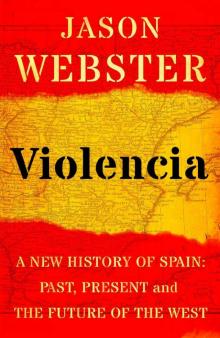 Violencia
Violencia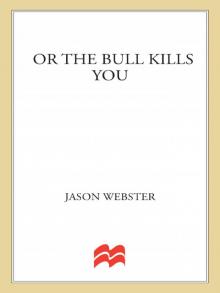 Or the Bull Kills You
Or the Bull Kills You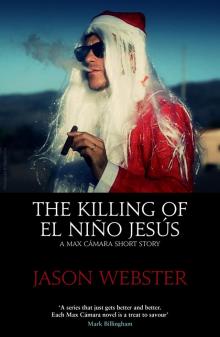 The Killing of El Niño Jesús
The Killing of El Niño Jesús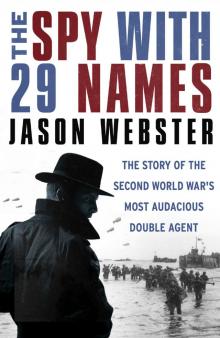 The Spy with 29 Names
The Spy with 29 Names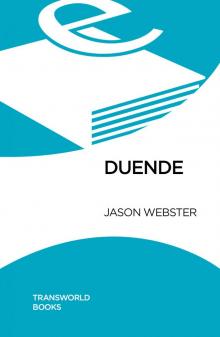 Duende
Duende Guerra
Guerra Sacred Sierra
Sacred Sierra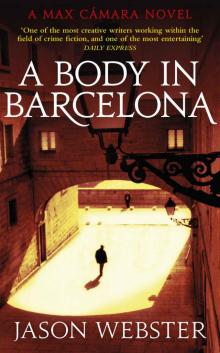 A Body in Barcelona: Max Cámara 5
A Body in Barcelona: Max Cámara 5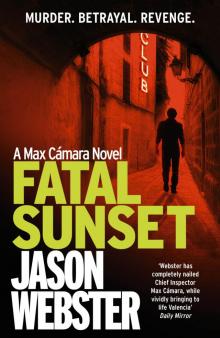 Fatal Sunset
Fatal Sunset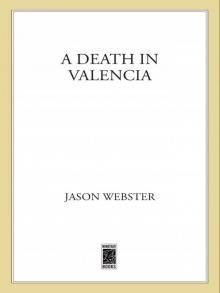 A Death in Valencia
A Death in Valencia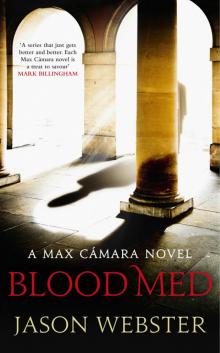 Blood Med
Blood Med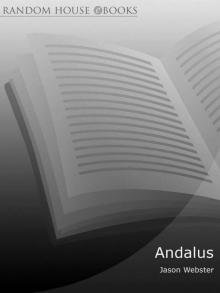 Andalus
Andalus